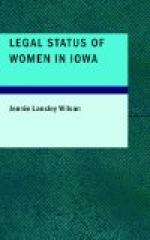to a wife in payment of a valid claim, even though
made at a time when the husband is largely indebted
to others, will not be considered fraudulent the wife
having the same right as other creditors to obtain
payment. All contracts between husband and wife
where no other consideration appears than an agreement
to perform some duty already incumbent upon the parties,
because of their relations as husband and wife, are
against public policy, and will not be enforced in
law. Such, for example, as a promise by the husband
to pay money to the wife to induce her to live with
him, when she has no legal ground for not living with
him; or an agreement to allow the husband to obtain
a divorce when he has no legal cause for divorce,
or a conveyance of property in consideration of future
care and support because the husband is growing old;
or a contract between husband and wife by which the
husband agrees to pay the wife at stated intervals,
sums of money, in consideration of the faithful performance
by the wife of the obligations incident to the marriage
relation. But our courts have held that exempt
property may be transferred by the husband to the
wife without any consideration; that a deed from husband
to wife in consideration of a dismissal by the latter,
of a proceeding for divorce, is valid; that a contract
between husband and wife by which the wife, for a
consideration, after a decree of divorce, agrees to
release all her dower interest in the real estate of
the husband, is binding. Voluntary conveyances,
in favor of third parties, by a man or woman in contemplation
of marriage, and with the evident intention of defeating
the marital rights of the other party, in such property,
will be held fraudulent, and may be set aside in an
action by the injured party after marriage. Contracts
and conveyances made before marriage and duly recorded,
will not be set aside on account of the marriage relation,
as the fact of recording is sufficient to charge the
wife with notice of the transactions. Ante-nuptial
contracts, if free from fraud and imposition, are
valid, and such a contract stipulating that each is
to have the untrammeled and sole control of his or
her own property, real and personal, as though no marriage
had taken place, will be enforced. The dower
right of each in the other’s property is completely
waived by such contract.
[Sidenote: Abandonment of either.]
In case the husband or wife abandons the other and leaves the state, and is absent therefrom for one year without providing for the maintenance and support of his or her family, or is confined in jail or the penitentiary for the period of one year or upward, the district court of the county where the husband or wife, so abandoned or not confined, resides, may, on application by petition setting forth fully the facts, authorize him or her, to manage, control, sell and encumber the property of the husband or wife for the support and maintenance of the family and for the purpose of paying debts. Notice of such proceedings




